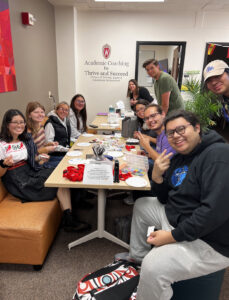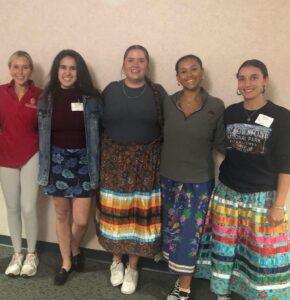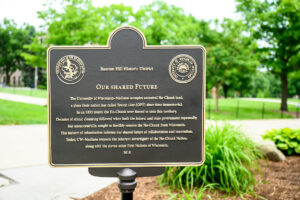Happy Native November! To celebrate, we are highlighting the work and voices of Native faculty and staff in the UW–Madison campus community. We asked Laura Hiebing, the Indigenous Student Services Coordinator with ACTS (Academic Coaching to Thrive and Succeed) how our community could celebrate Native November and learn more about Indigenous history, culture and heritage.
What are some things about Native American history and culture that we all should learn more about?

Indigenous people are incredibly diverse. There are 574 federally recognized tribes in the U.S. alone. In Wisconsin, there are 12 tribes (one is not federally recognized). Indigenous people share many things in common. But even within Wisconsin, each tribe and its culture, history, and communities, as well as the personal experiences of Indigenous individuals, are unique.
Reclaiming Native Truth is a national effort to foster cultural, social, and policy change by empowering Native Americans to counter discrimination, invisibility, and the dominant narratives that limit Native opportunity, access to justice, health, and self-determination. The project conducted an unprecedented research campaign designed to increase our understanding of the dominant narrative about Native peoples in the United States.
They have an excellent guide for allies: Changing the Narrative about Native Americans: A Guide for Allies | First Nations Development Institute
What are the key takeaways for the UW–Madison community in celebration of Native November?
2023 marks the 10th anniversary of Native November on this campus. Native November is a great opportunity to celebrate Native American heritage. But the celebration of Native people, accomplishments, and talent shouldn’t be limited to one month. We should celebrate Indigenous contributions to our campus community throughout the year, and non-Indigenous people should learn from this.

This year’s Native November theme is “Laughter is Medicine.” I hope this month offers opportunities for the campus community to share that laughter. It is also an opportunity to recognize that Indigenous people are impacted by, but not defined or limited by, the negative narratives people are most familiar with.
In the past ten years, so much incredible growth has happened on campus within the Indigenous community. For example, in 2022, the NDGNS program was established (pronounced in-dig-en-ous). NDGNS: The Network for Development & Growth of Indigenous Scholars includes two components, a fellowship program and a living community.
The NDGNS UW fellowship program is on its second cohort this year. The new NDGNS Affinity Living Community in University Housing also opened this fall. NDGNS offers scholars the financial and time capacity to focus on academics and to participate in a wide variety of academic, social, cultural, and community-oriented events. These events are a collaborative effort by ACTS (Academic Coaching to Thrive and Succeed), University Housing, the Native Nations UW AUNTIES (Advocates for Uplifting Native Traditions & Indigenous Engagement), UNCLES (Upholders of Native Communities, Leadership & Education), COUSINS (Cultural Organizers Uniting and Strengthening Indigenous Networks) and other campus and community partners.
The Aunties, Uncles, and Cousins are united through a collaborative approach to our shared goals as members of the Native Nations UW Indigenous Student Wellbeing Subcommittee. This committee advocates for and prioritizes -the physical, intellectual, emotional, and spiritual well-being of Indigenous undergraduate, graduate, and professional students at UW–Madison.
NDGNS scholars attend approximately one event per week throughout the year. They are paired with faculty or staff mentors on campus. They can access academic and well-being support and resources. NDGNS scholars have reported a dramatic increase in their sense of belonging, community, well-being, and connectedness, and we have seen engagement and involvement continuously rise as the program grows.

How can the UW–Madison community respect and honor the Native American community during Native November and year-round?
All campus community members have a responsibility to commit to their own learning. Everyone should learn more about the history of the land our University is on and what that means to each one of us, individually and collectively. You can read about the UW–Madison heritage marker [which] honors the Ho-Chunk and recognizes land as ancestral home on Bascom Hill. Many people mistake the statement on this heritage marker as an official university land acknowledgment. It’s not, and we don’t have one.
Whenever you feel compelled to recite these words in a class, meeting, conference, email signature, etc., take a step back and re-read Our Shared Future. What is your goal in reciting the statement printed on the heritage marker? Is it aligned with Our Shared Future’s intentions? Does it honor the needs of Indigenous students, staff, faculty, and community members?
Hire more Indigenous faculty and staff across campus. This blog post offers additional suggestions. If you can, donate to the Indigenous Student Center. Donations support a wide variety of programming focused on creating community for Indigenous students at UW–Madison. Students provide ongoing input on what type of programming they want to see.